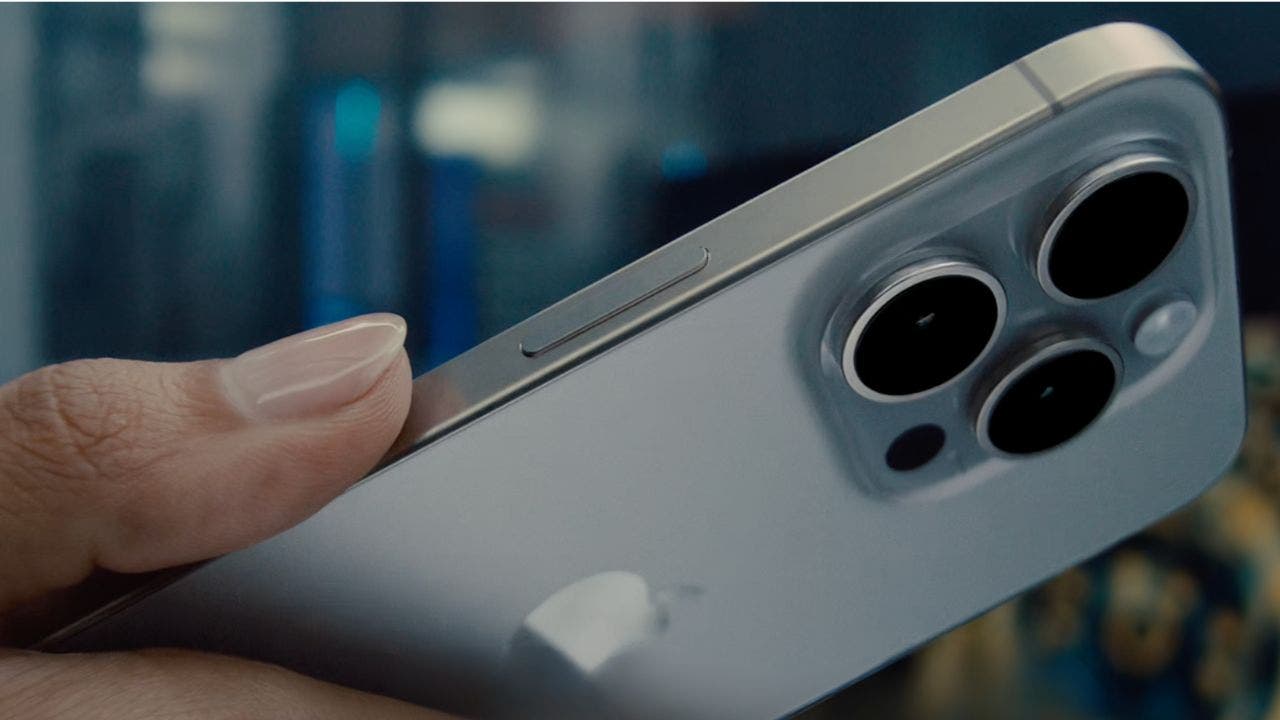We’ve all heard before that our cellphones are listening to us and monitoring our every move. While this has been debunked (or, at least, explained), the fact of the matter is that data tracking is standard practice by the most popular mobile carriers these days.
And still in 2024, even with complaints from users, new tracking methods are continually emerging, making it harder for users to take back control of their data.
So, what do you need to know exactly about how your mobile carrier tracks your data? And how can you reclaim your privacy without having to say goodbye to your mobile carrier altogether?
GET SECURITY ALERTS, EXPERT TIPS – SIGN UP FOR KURT’S NEWSLETTER – THE CYBERGUY REPORT HERE

Women looking at a phone (Kurt “CyberGuy” Knutsson)
ASK ANY TECH QUESTION, AND GET KURT’S FREE CYBERGUY REPORT NEWSLETTER HERE
What is data tracking, and what do mobile carriers collect?
To start, let’s talk about what “data tracking” actually means. Data tracking is when companies collect information about a user’s online activities, including but not limited to their browsing history, location data, messaging information and app usage.
This data is used directly by the company collecting it or shared with third-party companies to ultimately tailor their advertising to you. (There are other justifications for this, such as “improving services.” But nowadays, targeted advertising is the primary reason, which leads users to feel more and more like their phones are listening in on them.)
Data tracking may look different from one company to the next. When it comes to mobile carriers, they can collect a wide range of information about their users, which is no surprise since, for most of us, our phones are an extension of ourselves. Therefore, it’s important for you to be aware of these practices and actively manage your privacy settings to maintain control over your personal information.
NO MORE MISSED ALARMS: HOW TO CRANK UP YOUR IPHONE’S ALARM VOLUME

A woman holding an iPhone (Kurt “CyberGuy” Knutsson)
MORE: FCC SLAPS AT&T, VERIZON, T-MOBILE WITH MEGA FINES FOR DATA DECEIT
Different ways mobile carriers collect data
Mobile carriers employ a variety of techniques to gather specific data from their users:
T-Mobile
- User behavior profiling: T-Mobile analyzes personal data to predict user behaviors and preferences, which can influence future services and marketing strategies.
- Research support: The carrier shares data to aid public and scientific research initiatives, ensuring that personal identifiers are removed.
- App usage analysis: Tracks the frequency and duration of app usage to gather insights into user preferences and habits.
- Advertising personalization: This process collects information on app usage and demographic details to tailor advertisements more closely to the user’s interests.
Verizon
- Network usage insights: Verizon uses data like web browsing and app usage to offer additional services or upgrades.
- Aggregate consumer insights: Combines user data with external data to generate insights into consumer behaviors and trends.
- Customized user experience: Verizon analyzes the websites and apps users engage with to create a more personalized service experience.
- Marketing optimization: Uses detailed user data to refine and personalize marketing efforts and service offerings.
AT&T
- Browsing and location tracking: AT&T collects detailed records of users’ web browsing and location to customize ads and offers.
- Automated decision-making: They employ algorithms to use collected data to make automated decisions that affect the ads and content presented to the user.
- Demographic and viewing data: Gathers demographic information alongside viewing habits to better understand and segment their user base.
- Identity verification services: AT&T shares certain data with third parties to facilitate identity verification and fraud prevention measures.
Feeling a bit surprised by all of this? Yeah, we are, too.

A person holding a phone (Kurt “CyberGuy” Knutsson)
MORE: AT&T DATA LEAK FROM 73 MILLION CUSTOMERS; WHAT YOU NEED TO DO NEXT
How to turn off data tracking on your device based on your mobile carrier
If you don’t want your mobile carrier to have so much overarching access to your data, there are ways you can stop them. The problem is that most mobile carriers aren’t going to broadcast this information because it’s beneficial for them to maintain this access.
However, that’s why we’re here to help. Managing your data privacy involves understanding the settings available on your mobile device. Below, you will find instructions for disabling data tracking on devices served by the major U.S. carriers – T-Mobile, Verizon and AT&T – as well as a general guide for other carriers.
T-Mobile
To adjust privacy settings on a T-Mobile device:
Log into your T-Mobile account.
- Navigate to My Account, then click on Profile.
- Scroll to the bottom and select Privacy and Notifications, then Privacy Dashboard.
- Here, you can toggle off various options:Share data for public and scientific research: Prevents the use of your data for external research projects.Analytics and reporting: Stops the aggregation of your usage data for business reports.Advertising options: Limits personalized ads based on your app usage and other collected data.Profiling and automated decisions: Opt out of data usage for profiling purposes.Do not sell or share my personal information: Ensure your data is not sold or shared externally.
- Share data for public and scientific research: Prevents the use of your data for external research projects.
- Analytics and reporting: Stops the aggregation of your usage data for business reports.
- Advertising options: Limits personalized ads based on your app usage and other collected data.
- Profiling and automated decisions: Opt out of data usage for profiling purposes.
- Do not sell or share my personal information: Ensure your data is not sold or shared externally.
Additionally, T-Mobile offers a separate app to limit data shared with third-party advertisers through the Magenta Advertising Platform.
GET FOX BUSINESS ON THE GO BY CLICKING HERE
Verizon
To manage privacy settings on a Verizon device:
- Log into your Verizon account.
- Go to Account, then Account Overview and select Edit Profile and Settings.
- Choose Manage Privacy Settings.
- You can adjust the following:Customer Proprietary Network Info: Opt out to stop Verizon from using your data to market additional services.Business and Marketing Insights: Disable this to prevent the use of your data for creating consumer insights.Custom Experience and Custom Experience Plus: Opt out to stop personalized marketing based on your web and app usage.
- Customer Proprietary Network Info: Opt out to stop Verizon from using your data to market additional services.
- Business and Marketing Insights: Disable this to prevent the use of your data for creating consumer insights.
- Custom Experience and Custom Experience Plus: Opt out to stop personalized marketing based on your web and app usage.
Resetting the Custom Experience settings will also stop Verizon from using previously collected browsing and location data.
AT&T
To disable data tracking on an AT&T device:
- Log into your AT&T account.
- Navigate to Profile, then Privacy Choices.
- AT&T offers four main toggles you can turn off:Personalized Plus: Stops the use of your location and browsing data for personalized ads.Personalized: Disables automated decision-making using your data.Share or sell my personal information: This prevents AT&T from sharing your data for advertising purposes.
- Personalized Plus: Stops the use of your location and browsing data for personalized ads.
- Personalized: Disables automated decision-making using your data.
- Share or sell my personal information: This prevents AT&T from sharing your data for advertising purposes.
It’s recommended that identity verification be kept active for security purposes.
MORE: TOP AFFORDABLE CELLPHONE PLANS
Other carriers
If you don’t use one of the above mobile carriers, the steps are likely very similar. But if you have any doubts, talk to your mobile carrier directly, perhaps by going into a store or searching online about how to do it for your specific carrier.
- Log into your account through the carrier’s website or app.
- Locate the privacy settings or preferences, which may be under sections labeled as Privacy, Security, or Data Management.
- Review and adjust the settings to limit data tracking as per your preference.

A woman on her phone (Kurt “CyberGuy” Knutsson)
MORE: TIDY UP YOUR TECH: SPRING-CLEANING TIPS FOR SAFEGUARDING YOUR DATA
Strengthen your privacy with a VPN
While disabling carrier tracking is an important step, using a virtual private network (VPN) adds an extra layer of protection for your mobile data. A VPN encrypts all of your internet traffic and routes it through a secure server, shielding your online activities from prying eyes, including your carrier.
With a trusted VPN service, your carrier won’t be able to see which websites you visit, what you search for or the contents of your communications. Your IP address and location will also be masked. Setting up a VPN on your smartphone is easy and affordable, with many top providers offering mobile apps. Just be sure to choose a no-logs VPN with robust encryption that doesn’t sell your data to third parties. Combining VPN protection with disabling carrier tracking maximizes your privacy on the go. For the best VPN software, see my expert review of the best VPNs for browsing the web privately on your Windows, Mac, Android & iOS devices.
Kurt’s key takeaways
Even as users voice their concerns about their data, mobile carriers are still finding creative arguments to justify what they take and why they take it. It’s more important than ever to take your data into our own hands and utilize these tips to keep your data private as much as possible. Remember, if your data falls into the wrong hands, you have a much higher chance of becoming a victim of a cybercrime.
CLICK HERE TO GET THE FOX NEWS APP
What do you think about all this data privacy information? Will this information influence how you choose your mobile carrier in the future or how you’ll take control of your data? Let us know by writing us at Cyberguy.com/Contact.
For more of my tech tips and security alerts, subscribe to my free CyberGuy Report Newsletter by heading to Cyberguy.com/Newsletter.
Ask Kurt a question or let us know what stories you’d like us to cover.
Follow Kurt on Facebook, YouTube and Instagram.
Answers to the most asked CyberGuy questions:
Copyright 2024 CyberGuy.com. All rights reserved.





